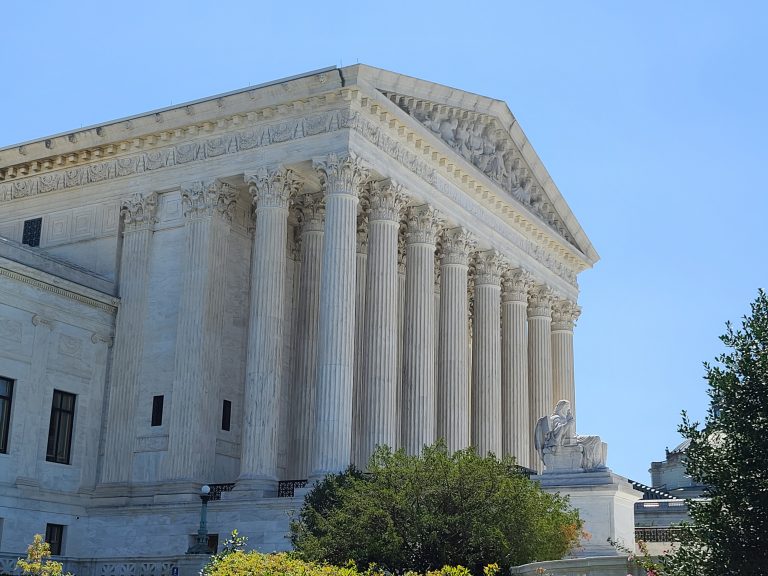The American Civil Liberties Union (ACLU) believes the restraining order gun ban is constitutional, but, more interestingly, the liberal group also thinks some gun laws aren’t.
On Monday, the ACLU filed a brief in United States v. Rahimi that asks the Supreme Court to reverse a Fifth Circuit ruling that struck down the prohibition on those subject to domestic violence restraining orders possessing guns. But they also said the power claimed by the Government in its brief was dangerously broad. And it went on to question the constitutionality of numerous gun laws both on their face and as they’re applied in practice.
“The historical record is replete with relevant analogues, from 17th century England to the colonial era to Reconstruction, in which governments restricted gun possession by persons individually adjudged to pose a risk to others,” the ACLU wrote in its brief. “The United States’ brief lays out multiple examples of disarming such individuals predicated on specific findings of specific threats even as it urges the Court to adopt a far more expansive principle than necessary here. While some historical restrictions on gun rights were overbroad, lacking in due process, or rested on racist assumptions, the record nevertheless provides clear support—as then-Judge Barrett recognized—for the narrower principle that the Government can deny access to guns to people who pose a specific threat of violence to others.”
The group took a relatively expansive view of who, writ large, is covered by the Second Amendment. It cautioned the Government’s view of its own power to restrict the rights of those it protected is overly vague.
“The Court need go no further and adopt the United States’ sweeping assertion of power to deny Second Amendment rights to anyone not deemed a ‘law-abiding, responsible citizen,'” the ACLU wrote. “Constitutional rights generally extend to all persons within the United States, citizen and non-citizen alike. And it would be alarming if an individual’s entitlement to a constitutional right turned on the Government’s vague determination of whether they were ‘responsible.’ Nothing about the historical record or this case requires embarking on that path in order to reverse.”
Instead, it argued for a much more limited view of the Government’s power to restrict gun access.
“All the Court needs to do—and all that it should do—to reverse the decision below is to recognize that the founding generation, like their common law forebearers and Reconstruction-era officials after them, routinely restricted access to guns by individuals adjudged to pose a specific threat of violence,” the group wrote. “Court-imposed, time-limited restrictions on firearms possession following an individualized finding of danger to an intimate partner or family member—as is at least the case where Section 922(g)(8) is satisfied through subsection 922(g)(8)(C)(i)—fit comfortably within this historical practice.”
The ACLU also rejected the recent trend of using bigoted historical gun bans as evidence of the constitutionality of modern restrictions.
“Our history also includes more categorical gun regulations that were explicitly racist,” the group said. “For example, from the founding through Reconstruction, American laws routinely denied Black persons the right to possess firearms. Such laws would plainly violate the guarantee of equal protection as we understand it today. There is no need to rely on such laws to uphold the individualized disbarment imposed by Section 922(g)(8).”
Additionally, while the group argued Rahimi’s restraining order leading to a gun ban was justifiable because a judge found him to be a specific threat against the mother of his child due to alleged previous acts of violence, it questioned the other type of restraining order that can lead to a gun ban. It argued barring somebody from owning a gun because they were subject to a restraining order that forbids committing violence against an intimate partner but doesn’t allege there’s a specific reason to believe the subject is a threat is on shakier constitutional grounds.
“It is a distinct question whether the historical analogues discussed above provide sufficient support for restrictions imposed on this lesser showing of need,” the ACLU wrote.
It also differentiated the restraining order ban from the other gun prohibitions found in federal law because the ban goes away once the order is lifted. The ACLU argued that because the same could not be said of other categorical prohibitions, some of them may violate the Second Amendment.
“Other subsections of Section 922(g) apply in perpetuity to broad categories of persons based on status alone, and are therefore more difficult to fit under historical precedents of disarming individuals found to pose a specific threat to others,” the group wrote. “They impose sweeping restrictions on all persons with a prior felony conviction, on persons who use drugs, on persons deemed mental unfit, and on ‘aliens,’ among others, without supplying such persons any opportunity to regain their Second Amendment rights. Those provisions require a different, and more searching, historical inquiry to determine whether they comport with the Second Amendment—an inquiry they may well fail to satisfy.”
The civil liberties group also questioned the application of gun laws. It argued enforcement of some restrictions is disproportionately targeted at minorities, especially burdensome possession restrictions.
“The ACLU is committed to fighting mass incarceration and overbroad gun possession laws that fuel that phenomenon. It is committed to equal protection of the law and opposes the use of gun possession laws to unfairly target people of color,” the group wrote. “And the ACLU is committed to due process and fundamental fairness for all, and therefore condemns procedures to restrict constitutional liberties arbitrarily, without due process, or that impose unnecessarily excessive restrictions.”
Even so, the group concluded the questionable constitutionality of some firearms regulations is a question for another case because the law at issue in Rahimi is sound.
“But this case does not present such policy or constitutional questions,” the ACLU wrote. “It asks only whether one particular gun regulation, which prohibits firearms possession by persons subject to certain domestic violence restraining orders, on its face violates the Second Amendment. It does not.”
Understandably, the ACLU’s brief is already eliciting skepticism from some gun-rights activists. The liberal group filed a brief in support of New York’s effective ban on gun carry during last year’s New York State Rifle and Pistol Association v. Bruen under the dubious claim that striking it down would imperil New Yorkers’ First Amendment rights. This brief suggests the ACLU would support other challenges to gun laws, but it doesn’t change the reality that they have yet to do that in a Supreme Court case.
The ACLU’s brief also faces the same fundamental problem the Government’s brief ran into: There weren’t restraining orders that authorized confiscating guns from those accused of domestic violence during the Founding Era.
It has tried to address this issue by noting a “historical twin” isn’t necessary under the Bruen standard. It also argued that domestic violence and firearms were quite different in early American history. It claims domestic violence wasn’t taken seriously until much later. And the ACLU said firearms development in the centuries since the Second Amendment was ratified has led to their increased use in domestic abuse, thus creating a uniquely modern problem the Founders couldn’t have foreseen, so a broader approach to IDing the analogues required by Bruen.
It’s certainly possible this line of argument will convince five justices. However, it will have to overcome the basic fact that domestic violence and guns existed at the founding, but a law banning the possession of the latter because of a restraining order triggered by the former didn’t exist.
The Government’s practical argument that overturning the law would result in laws from nearly every state being affected does seem likely to help get some of the conservative justices to adopt this line of thinking. However, the ACLU’s suggestion of limiting the Government’s ability to restrict gun ownership to only those found by a judge to be a specific threat to others could provide those same justices with the comfort to make that decision.
It would not be surprising to see a Supreme Court reluctant to toss a widely accepted temporary gun ban take the ACLU’s third way to uphold it while limiting the Government’s potential reach.






